On August 14th, educators and primatologists joined PEN for our symposium, panel discussion, workshop, and dinner reception at the International Primatological Society (IPS) Congress in Hanoi, Vietnam. Our colleagues came together to share experiences, learn from each other, and collaboratively solve challenges in primate conservation education.
SYMPOSIUM
Dispersing Seeds of Knowledge: Case Studies in Primate Education & Outreach From Latin America, Africa, & Asia
Our symposium showcased primate education methodologies, challenges, lessons learned, and impact metrics, indicating successful approaches that influenced primate conservation across 10 countries. Case studies were represented from Colombia, Peru, Morocco, Republic of Congo, Uganda, Madagascar, India, Cambodia, Vietnam, and Indonesia. PEN’s Executive Director, Amy Clanin, chaired our symposium. Amy began the symposium by presenting on PEN’s measurable progress since her introduction of the network at the 2012 IPS Congress in Mexico.
1. Advancing the Field of Primate Education: An Innovative Global Model For Collaboration
PEN was founded to provide a community and collaboration platform for primate conservation educators worldwide. In her presentation, Amy shared PEN’s model and our 2014 Global Survey results, including the greatest challenges faced by educators and how PEN is addressing their needs. Read abstract
2. Promoting Primate Conservation Through Collaborative Workshops in Colombia & Peru
Xyomara Carretero-Pinzon, PEN Regional Coordinator for Colombia and Venezuela, and Fanny M. Cornejo, former PEN Regional Coordinator for Peru and Yunkawasi Research Coordinator, discussed the results of our collaborative workshops in South America. During our Q&A, Lina Maria Valencia, who attended PEN's workshop in Colombia, shared how our training empowered her to design and implement an education program in her region. In Peru, Fanny explained how our workshop led to a new collaboration between Yukawasi and RARE. Read our Colombia workshop abstract and Peru workshop abstract
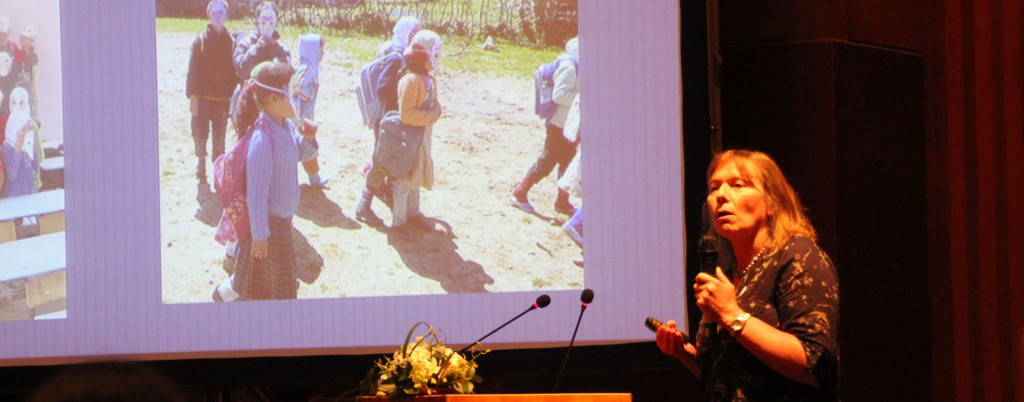
Sian Waters, Barbary Macaque Awareness & Conservation, Morocco
3. Inspiring Behavior Change to Conserve Barbary Macaques in Morocco
Sian Waters, BMAC Director and PEN Regional Coordinator for Morocco and Algeria, shared her successes and lessons learned from Morocco on inspiring behavior change in shepherds that led to a decrease in the illegal trade of Barbary macaques in her region. Read abstract
4. Billboards Lead to Reduction in Illegal Trade of Great Apes in Congo Republic
Debby Cox, Senior Technical Advisor of the Jane Goodall Institute (JGI), reported on the success of her organization’s roadside billboard campaign in the Congo. She explained that their mass outreach method requires minimal capital and can quickly lead to measurable impact. Debby also showed examples of JGI’s web-based M&E tool developed using Google’s Open Data Toolkit. Read abstract
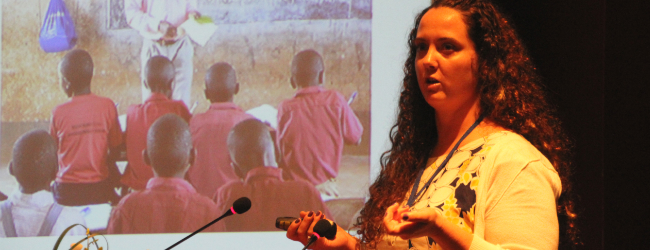
Michelle Slavin, UNITE for the Environment, Uganda
5. Integrating Primate Conservation into Public Education in Uganda
Michelle Slavin, Director of UNITE for Environment in Uganda, shared her organization’s program effectiveness and methods in training teachers in 11 schools. A key insight was that conservation education in schools, although important, might take longer to implement and realize results. Read abstract
6. Creative Methods for Challenging Environments in Madagascar
Susie McGuire, Creative Director of Conservation Fusion in Madagascar, presented a portfolio of proven ideas to make education more creative, accessible (to populations with low literacy), and verifiable. Methods like “Junior Research Day”, conservation festivals, interactive mapping, and art projects are effective ways of engaging stakeholders. Read abstract
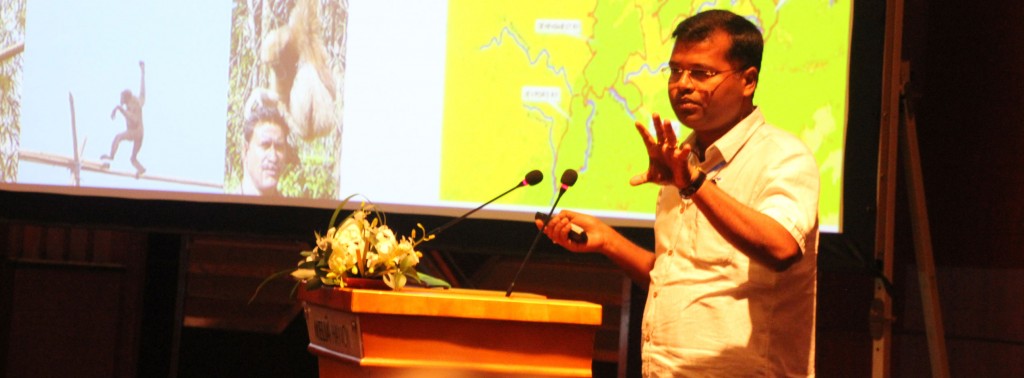
Jihosuo Biswas, Primate Research Centre, NE India
7. Widespread Outreach in Protected Areas in India
Jihosuo Biswas of Primate Research Centre NE India presented his organization’s education efforts to conserve hoolock gibbons. His team has organized 15 campaigns thus far, covering five protected areas and reaching approximately 4,000 children and 500 community members. Read abstract
8. Eco-Clubs & Community Outreach in Cambodia
Daniel Roper-Jones, Education Manager of Angkor Centre for Conservation of Biodiversity in Cambodia, talked about creating eco-clubs, community night shows, and more. He also shared tactical ways of using application processes to join eco-clubs as part of a regional evaluation. Dan and his team established structured and simple Excel-based tools and processes to evaluate stakeholders. Read abstract

Brad Parks, Denver Zoo, Vietnam
9. Introducing Unknown Primates to Rural Populations in Vietnam
Brad Parks of the Denver Zoo talked about creative approaches to introduce an unknown species into a community’s culture in Vietnam. His program accomplished this by introducing communities living in lowland areas to the snub-nosed monkey living in highland areas. The Denver Zoo engaged village communities with costumed mascots, distributed plush toys proportional to the primate population, and more. Read abstract
10. Using RARE’s Approach to Reduce Bushmeat Consumption in Sulawesi
Thirza Loffeld, Education and Advocacy Coordinator of Selamatkan Yaki in Indonesia, presented her organization’s program that used RARE’s approach to measure behavior change. She shared her organization’s EARS program, which included classroom visits, exhibitions, radio talk shows, and a workshop for priests. Read abstract
“My education staff enjoyed the symposium because they could see the different education programs from around the world and realize that we aren’t the only ones doing it.”
– PEN symposium participant
PANEL
Engaging Educators and Experts to Foster Synergy & Collaboratively Solve Case Study Challenges
To build on insights shared at the symposium, PEN hosted a panel (moderated by Pradeep Suthram, PEN Director of Technology) to discuss primate education and our network. Russ Mittermeier, President of Conservation International, Debby Cox, Senior Technical Advisor of the Jane Goodall Institute, Marc Ancrenaz, Scientific Director of HUTAN, and Amy Clanin, Executive Director of PEN, participated in our panel. Read panelist bios
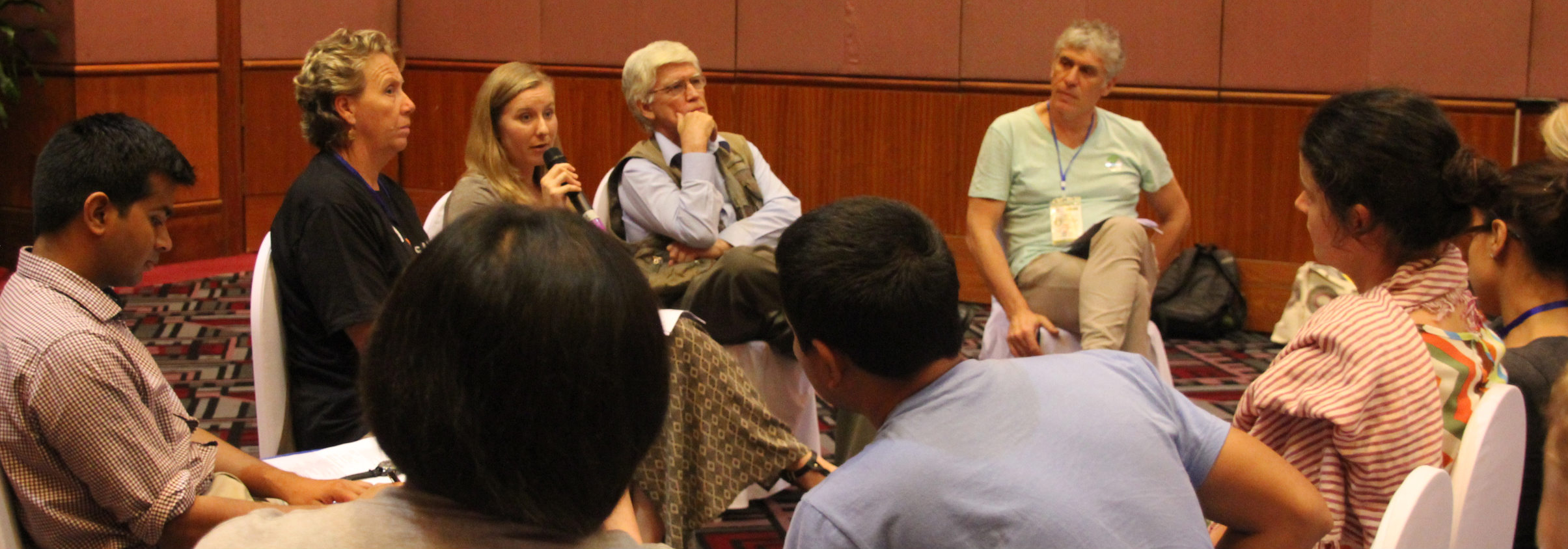
Our panelists discussed the importance of education and shared insights from their experience and expertise on primate conservation and education.
“If you don’t do education, you will lose a generation.”
– Debby Cox, Jane Goodall Institute
Some of the panelists' discussion points and recommendations included:
- Learn from experienced educators and their projects regionally and internationally.
- Involve and gain support from government officials and scientists.
- Utilize social media and other technologies to share conservation messaging and to learn about what other projects are doing. Even if you are working in a different country, many ideas can be adapted.
- Start simple. If you don’t have a structured education program, consider organizing a field trip for children to observe primates in the forest.
- Formal education can take longer to observe behavior change. A billboard campaign can lead to tangible outcomes in six months, which can be shared with potential funders to prove how education can be effective.
- Take action! Become a member of PEN to connect with other educators and projects, share your story, register your primate education project, download resources, access our bibliography, enter Challenge Prize Contests, and more!
WORKSHOP
Following the panel, our colleagues were grouped into geographical teams to solve reality-based challenges in primate education. PEN’s Regional Coordinators, Sian Waters, Xyomara Careterro-Pinzon, Thirza Loffeld, and panelist Marc Ancrenaz facilitated the group discussions.
“I found the workshop useful because the group problem solving was so powerful!”
– PEN workshop participant
The following three case study challenges were shared from Latin America, Africa, and Asia during the workshop:
- Gabriela Cabral Rezende’s case study challenge was on how to secure sustainable funding and reduce donor fatigue for her organization's black lion tamarin conservation education program in Brazil.
- Amanda Korstjens’s case study challenge was on how to educate tourists, local guides, park staff, and local communities and eliminate provisioning of monkeys in The Gambia.
- Rijal Bishwanath’s case study challenge was on how to change attitudes of local communities and resolve the issue of macaques coming out of the national park to crop and garbage raid in Nepal.
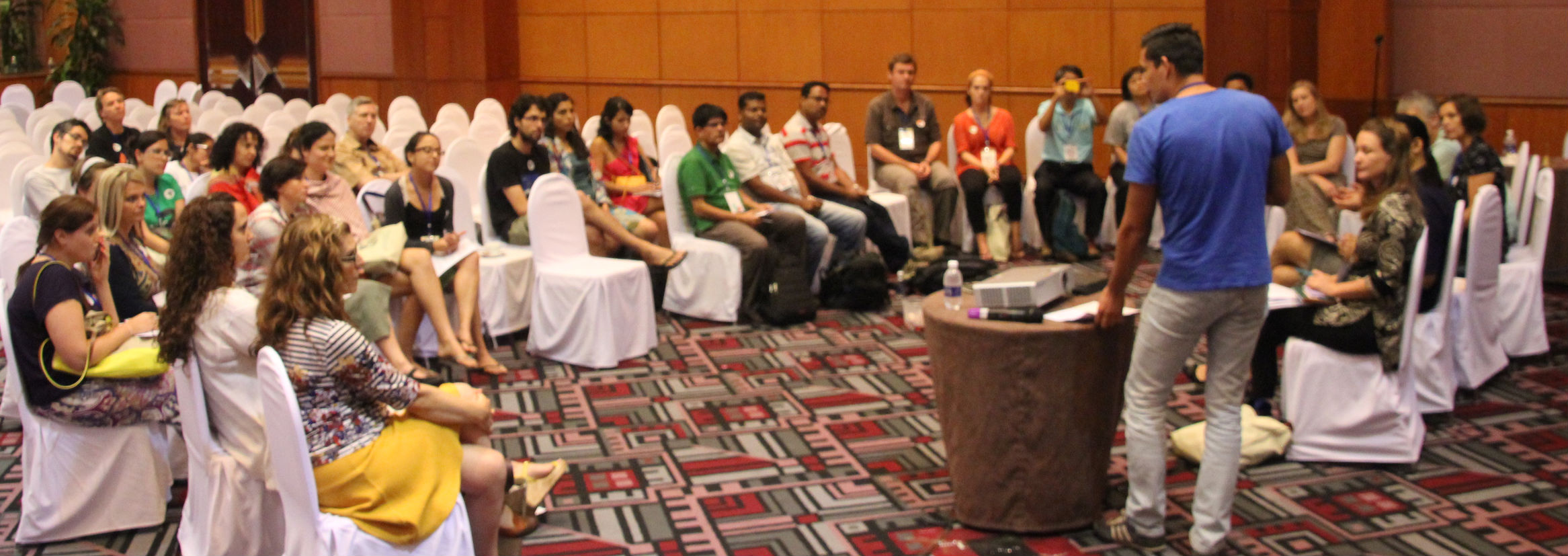
Following the sub-group work, teams reported out to the entire group of workshop participants on their approaches in addressing and solving the challenges.
Our Impact
PEN's workshop participants represented over 20 primate range countries. Although all participants rated the workshop to be useful, a large majority (82 percent) rated the workshop to be very useful. Additionally, three out of four participants said that they would apply what they learned at their project locations in the field. These post-workshop results validate PEN’s mission, approach, and focus on collaborative learning in addressing the widespread needs of primate conservation educators.
“The ideas shared by the other participants were very enriching and I will bring them to our team for discussion.”
– PEN workshop participant
DINNER RECEPTION
After participants presented their new and collaborative solutions to the audience, food and drinks followed at a PEN reception. It was exciting for us to come together at the end of the day (after over six hours of working together during our symposium, panel, and workshop!) with our friends and colleagues involved in primate education across the globe.
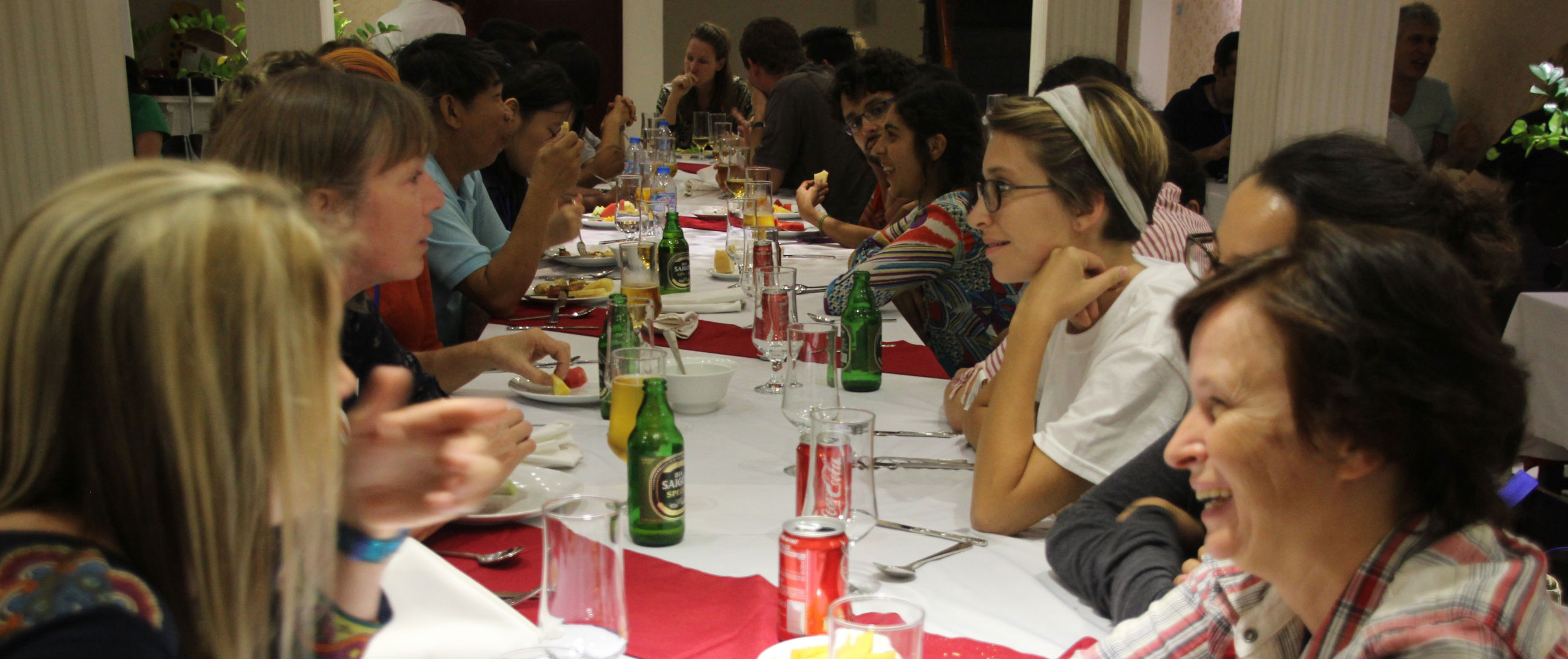
Our dinner reception gave participants a chance to chat informally with the PEN team, panelists, and each other in the context of primate conservation.
SPECIAL THANKS
Our team is humbled to have hosted such a great community of engaged and committed educators and primatologists. We would like to thank our participants, symposium speakers, panelists, and volunteers. We would also like to express our deepest gratitude to the Primate Action Fund for their support and the International Primatological Society for their leadership in organizing the Congress and space for PEN to host our events.
Visit our symposium and panel, workshop, and dinner reception Facebook albums to view more photos from our events!








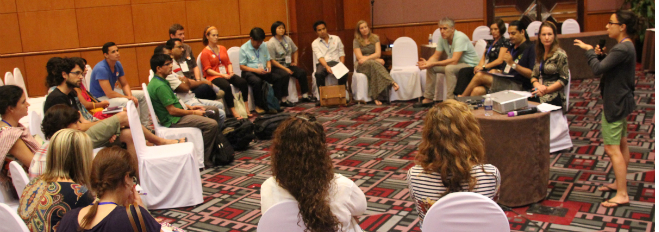
I want to thank all the participants for sharing their experiences and ideas. I want also to thank Amy C and the team for organising such a great symposium. You did a great job.
Its such a great opportunity to learn what transpired at the IPS, especially for some of us who couldn’t make it.
Thank you